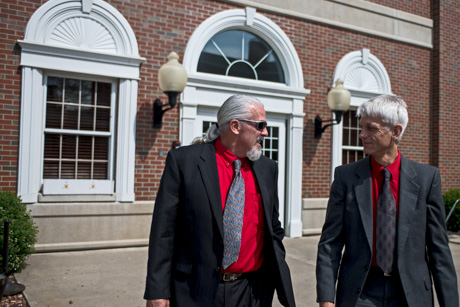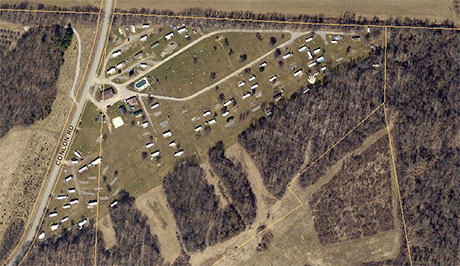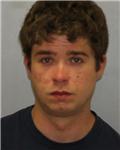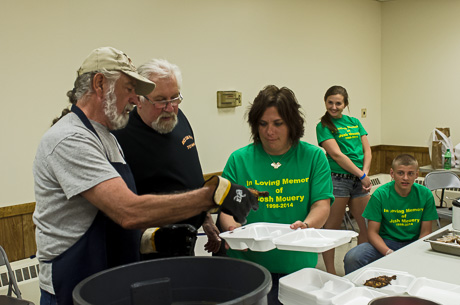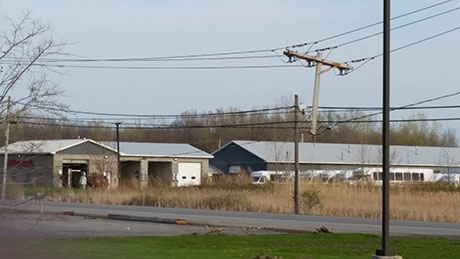Top photo, Greg and David Luetticke-Archbell, owners of Frost Ridge. Inset, Attorney Reid Whiting, representing the Town of Le Roy.
In a 90-minute hearing, all three attorneys in the Frost Ridge land use lawsuit had a chance to make their case before Judge Robert C. Noonan, who said at the end of the hearing he will rule soon on whether the more than 50 year old campground in Le Roy should be shut down.
The two plaintiffs in the dispute -- the Town of Le Roy in one lawsuit; and David Cleere, Marny Cleere, Scott Collins and Betsy Collins in the other -- are seeking a temporary judgement to stop the campground from hosting any concerts and to bar camping altogether at the facility.
David Roach, representing the owners of Frost Ridge, David and Greg Luetticke-Archbell, said even a temporary order would potentially drive the campground out of business.
A shutdown would lead to more than $100,000 a month in lost revenue, as well as put at least 38 people out of work, according to court documents filed by Roach. The campground has at least $1.8 million in local economic impact accounting for $148,000 in sales tax revenue for the county.
At issue is whether the campground constitutes a legal, nonconforming use in the current residential/agriculture zoning district and whether concerts at the venue are covered by that existing variance.
There are very few points the two sides agree on.
The land now occupied by Frost Ridge (purchased for $174,000 by David and Greg in 2008, according to mortgage documents on file with the county) was originally owned by Janet McPherson Frost, the grandmother of two of the plaintiffs, Marny Cleere and Betsy Collins.
In 1957, the land was leased to John Mattern for winter skiing.
At some point, Mattern added camping. Roach maintains in court documents that campsites were first installed in 1963. Reid Whiting, attorney for the Town of Le Roy, and Mindy Zoghlin, attorney for the other plaintiffs, maintain there is no proof of campsites on the property prior to 1967.
That year is significant because that's the year the area was rezoned to R+A. Prior to that, according to the Luetticke-Archbell team, the land was considered a recreational use area by town planners.
In 1972, the McPherson Family sold the land to Frost Ridge, Inc.
In 1998, the owners of Frost Ridge at the time sought to clarify the zoning of the land and asked the Zoning Board of Appeals for an interpretation of the code.
The ZBA declared the property a nonconforming preexisting use and, as such, legal as a campground (the defendants maintain as a "recreational facility," which would include music entertainment). The ruling also barred any expansion of the campground without zoning and planning board approvals. The owners were not allowed to add buildings or amenities.
Whiting told Noonan today that the ZBA reached the conclusion in error because it was told incorrectly that there were campsites on the property prior to 1967.
The assertion that there were campsites prior to 1967 is merely a self-serving claim by the current owners, who couldn't possibly know whether it's true because they didn't live in the area at the time, Whiting said.
Neither Whiting nor Zoghlin shared what Cleere and Collins, who apparently grew up in the area, might know about campsites prior to 1967.
In 2002, the site was sold to Lei-Ti Too, LLC.
Lei-Ti applied for and received building permits to add buildings to the property as well as an above-ground pool and an in-ground pool.
These approvals were granted in apparent contradiction of the 1978 ZBA ruling.
Whiting said that these building permits, given in error, do not mean the current town board has no right to now enforce the local zoning ordinance. Zoghlin agreed.
"The long and the short of it is a building permit cannot grant rights in violation of zoning laws even if the permits were granted illegally," Zoghlin told Noonan. "Improperly granting a use doesn't prevent the town from later correcting the error."
She cited a case in New York City where a builder was ordered to remove the top 12 floors of a newly constructed building after it was found he received permission for the taller building in error.
David and Greg Luetticke-Archbell purchased the property in October 2008.
Whiting and Zoghlin claim they've increased the number of campsites.
Roach said, actually, they've reduced the number of RV sites from 167 to 157 and maintained the count of 30 tent sites.
What has perhaps caused a misunderstanding by the plaintiffs, Roach told Noonan, is that Luetticke-Archbell have run the business more successfully and attract more guests. More RVs at the campgrounds make it look like there are more campsites.
In July 2013, the Frost Ridge owners went back before the ZBA asking about the campground's nonconforming-use designation.
The ZBA -- and the county planning board -- determined it was a legal nonconforming use.
Whiting told Noonan the ZBA should not have reached that conclusion without consulting with the town's attorney, which is Whiting.
"The ZBA met in an informal session," Whiting said. "They did not seek my involvement. They didn't seek my counsel. They didn't interact with the planning board or the town board. I'm not hear to slam the ZBA. They're good people doing their best, but in these difficult matters, they should step back and seek the advise of counsel."
Both Whiting and Zoghlin argued that claims by the defendants that the statute of limitations has expired on the plantiff's legal standing to challenge the ZBA determination is faulty. Zoghlin said that by state law, the clock doesn't start ticking until the ZBA notifies the town clerk, and the town clerk was never notified.
Roach told Noonan that as an experienced municipal attorney, he finds Zoghlin's assertion unreasonable and out of step with actual practice throughout New York. New York law is complex and boards such as the ZBA are populated with volunteers and everyday citizens who do not know the nuances of every state law. It would be unreasonable to expect such boards to comply with every bit of minutia in state code, and in fact, he said, there's case law to support that conclusion. If the failure of a board to notify a clerk of a decision was upheld in the manner asserted by Zoghlin, there would be municipalities throughout the state that could find prior decisions challenged going years back. The clock started ticking on the statute of limitations, Roach said, when the decision was published in the board's minutes.
It was notable, Roach told Noonan, that there was no attorney in the courtroom representing the ZBA, even though the ZBA is named as a defendant in one of the suits.
Whiting said the ZBA was served but chose, by their non-attendance, not to be represented.
Roach responded, again citing his experience as a municipal attorney, that Whiting had the responsibility to ensure counsel was retained to independently represent the interests of the ZBA.
In June 2013, the town board passed a noise ordinance that prohibits unnecessary noise after 9 p.m. and prohibits noise that can be heard across a property line.
Whiting argued that one reason Noonan should grant the injunction against Frost Ridge is that the Cleeres can hear concerts on their property.
Roach argued in his court papers that the ordinance was clearly passed with the sole purpose of targeting Frost Ridge.
Greg and David claim Frost Ridge has hosted live music shows going back to at least the 1970s. Roach produced a photograph showing a large loudspeaker that was installed decades ago. Greg and David claim such loud speakers were all over the property at one time.
Roach said among his exhibits is a poster advertising a concert by the Ghost Riders in the 1990s.
The defendants claim they've had live music shows every season since 2009.
They've also produced two thank-you notes written by Marny Cleere in 2011 thanking them for tickets to a show and for running a good campground.
Zoghlin said the notes are being taken out of context. She also said her client doesn't remember being bothered by -- or even knowing about -- shows prior to 2011. The shows have gotten bigger and louder with each successive year since 2011, Zoghlin said.
The Cleeres have claimed that they can't sit outside their home on concert nights, the noise is so loud, and that when they try to go inside and close the windows, the walls shake because of the noise.
Roach argued that this assertion is merely anecdotal and the plaintiffs have failed to produce any empirical evidence that the volume of music has ever reached a nuisance level.
Meanwhile, he said, his clients hired a professional sound engineer to measure the noise levels on a concert night and found at the Cleere's home a noise level of 51 decibels, "which is 11 decibels above a rain drop and 7 decibels less than the nearby creek."
The Frost Ridge owners also requested a deputy come to the property one night and go to the Cleere residence and see if the noise rose to the level of a nuisance. The deputy, they said, found no problem with the noise level.
Zoghlin said these claims by Roach were hearsay and shouldn't be used as evidence.
The Luetticke-Archbells want to be good neighbors Roach said, and when they heard that the Cleeres had claimed to be bothered by the noise, they reduced the output of their loudspeakers on two different occasions and are prepared to lower the output again to 100 decibels.
"The Cleeres have never come to my clients directly and said, 'we have a problem with the music,' " Roach said. "Not once. They've gone to the town, but never to my clients."
While the plaintiffs assert the concerts have grown bigger and louder, Roach said the Frost Ridge owners have actually reduced the volume of the loudspeakers and that no concert in the entire history of the "Jam at the Ridge" series has ever drawn more than 400 to 500 people. While conceivably, the venue could accommodate 5,000 music fans, no concert in modern times at Frost Ridge has ever drawn even a fraction of that size crowd.
As part of his answer to the complaints filed by the plaintiffs, Roach attached affidavits from 10 neighboring property owners who all stated that Frost Ridge doesn't disturb their peaceful enjoyment of their property and specifically rejected the contention by the town that Frost Ridge is a public nuisance and is doing irreparable harm to the neighborhood.
The signers are Mark Buchman, Janet M. Whitney, Paul Klein, Karl Kleik, Deborah Kerr, Drionna Hall, Barbara Buchanan, Doreen Paladino, Carrie Poray and Ameka Cooper.
Whiting dismissed the complaints in his argument before Noonan saying that all of the signers lived too far away to truly be affected by Frost Ridge and that this case "isn't a popularity contest." He said no number of duplicative affidavits would address the substance of the alleged zoning code violations.
Roach argued that all of the signers are either close neighbors or direct neighbors of Frost Ridge. Ameka Cooper, for example, lives directly across the street from the concert venue on Conlan Road.
The Cleeres did have a couple of supporters in the courtroom audience today: Jen Gilligan, who lives around the corner from Oatka Trail, and Steven Osborne, who said he lives on the other side of the hill from Frost Ridge. Both said they are bothered by the noise from concerts.
"It's loud," Gilligan said, "and when I put my children to bed, with the air conditioner on, I can still hear the thumping and the beating."
She said she's been to the Cleere's house during the day during band rehearsals and witnessed tables rattling from the noise.
Osborne said the noise problem got worse last year and really upset his wife.
"I don't have a real problem personally with the concerts, but the decibel levels are way up high," Osborne said. "I don't know if there is (a solution that works for all parties), but from my perspective as an old fart that I am, the law is the law and if they're not doing what the law says, then they need to change what they're doing or change the law. Isn't that the way it works?"
Noonan told all parties they can expect a quick decision on the request for a preliminary injunction. A ruling on the injunction either way won't, per se, settle the lawsuit. Regardless of who prevails or to what degree, the suit could, in theory, go forward, even to a trial stage.
Clarification from yesterday's story: We indicated the Le Roy Fire Department had found minor code violations. The items cited by the Fire Department were not in fact violations, but recommendations.


